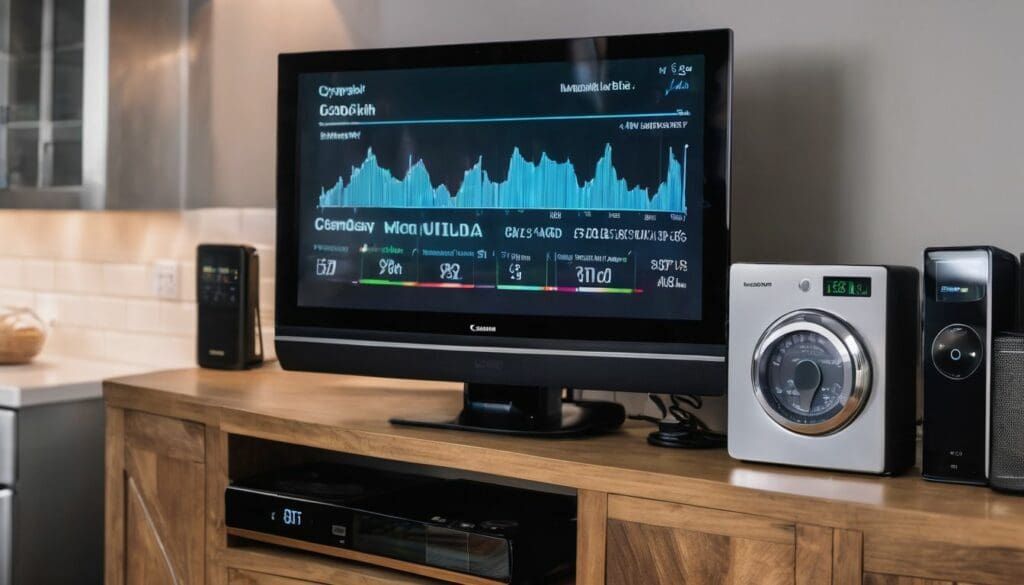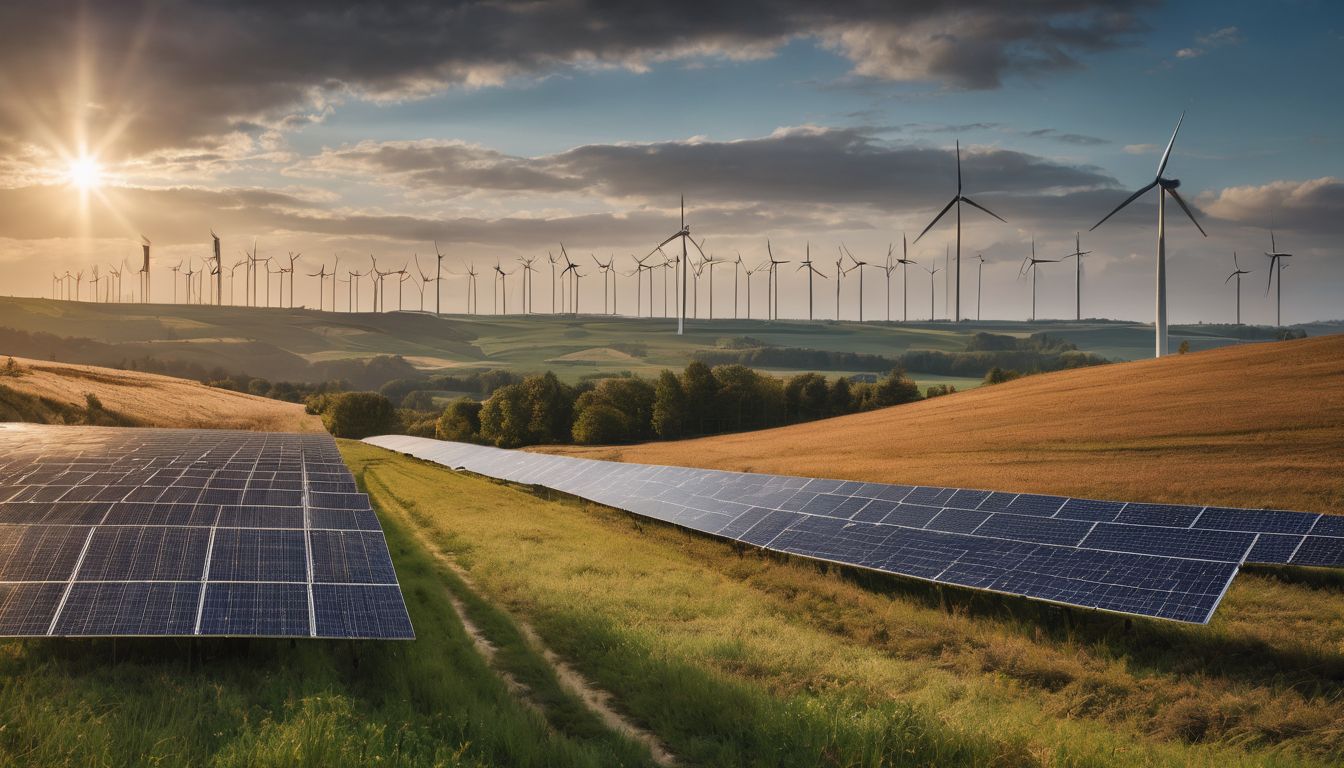Are you wondering how to cut down on your energy bills and do your bit for the planet? Smart meters are revolutionising the way we think about energy consumption, offering detailed insights into our daily use.
Our article will guide you through understanding these savvy gadgets and show you ways they can lead to smarter energy management at home. Get ready to discover a secret ally in saving money and reducing your carbon footprint!
Key Takeaways
- Smart meters provide real – time monitoring and control, enabling consumers to track their energy usage and make informed decisions about conservation, leading to cost savings and reduced environmental impact.
- These devices improve billing transparency by providing precise details on actual energy consumption, helping users identify areas where they can cut down on waste, thus promoting sustainable practices.
- With demand response capabilities, smart meters aid in balancing electricity supply and demand during peak periods, which helps in optimising the energy grid operation and minimising strain on resources.
- The integration of smart meter data analytics with building management systems allows for predictive maintenance. This maximises equipment reliability while preventing potential issues from escalating into costly repairs.
- Smart meters are central to integrating renewable energy sources into power grids efficiently. They facilitate the use of green energy by allowing more effective management of variable outputs from renewables like solar and wind power.
What are Smart Meters?
Smart meters are devices that measure and record electricity usage at frequent intervals, providing real-time data on energy consumption. They work by remotely transmitting information to utility companies, allowing for more accurate billing and monitoring of energy demand.
Definition and function
Smart meters are digital devices that track and record the electricity consumption of a building or home in real-time. They replace traditional analog meters and provide much more than basic meter readings; they communicate detailed energy usage information directly to the utility company.
This enables a smarter, more efficient electricity grid by allowing for precise power management and billing.
Their function extends beyond simple measurement. These meters play a crucial role in energy management by enabling two-way communication between the meter and the central system operated by electric utilities.
This advanced technology not only measures how much power you use but also when you use it, giving consumers greater control over their own energy demand. It helps reduce wasteful consumption while promoting sustainable energy practices as part of an integrated smart grid framework.
How do they work?
Smart meters work by measuring the energy consumption of a building and then securely transmitting this data to the utility company. They use advanced technology to capture real-time information on energy usage, allowing consumers and providers alike to monitor and manage usage patterns.
By leveraging two-way communication, smart meters enable demand response capabilities that adjust energy consumption during peak periods. This helps in optimising grid operation and minimising strains on the distribution network.
Using digital displays or online portals, consumers can access detailed insights into their energy usage habits. The meter’s ability to store historical data aids in identifying opportunities for conservation and efficiency improvements within a building.
Advantages of Smart Meters
Smart meters offer real-time energy monitoring, allowing consumers to understand and manage their energy consumption more effectively. They also have demand response capabilities, enabling utility companies to balance supply and demand for electricity during peak times.
Real-time energy monitoring
Smart meters enable real-time energy monitoring, providing instant insights into electricity usage. This empowers consumers to make informed decisions about their energy consumption and take steps towards greater efficiency.
By closely tracking energy usage patterns, individuals can identify opportunities for conservation and cost savings, contributing to a more sustainable future. Additionally, real-time data analytics from smart meters offer valuable information for optimising resource allocation and improving grid operations.
Incorporating smart metering technology into building management systems allows for the seamless integration of renewable energy sources, paving the way for enhanced sustainability in energy management practices.
Demand response capabilities
Smart meters enable demand response capabilities, allowing consumers to adjust their energy usage during peak hours. This empowers individuals to contribute to grid optimisation and reduce strain on the energy network, ultimately leading to energy conservation and cost savings.
Real-time data analytics from smart meters provides insights into when energy consumption is at its highest, enabling informed decision-making for efficient energy management. By participating in demand response programmes, individuals can actively support sustainable energy practices and contribute to a greener future.
Moving forward – The Impact of Smart Meters on Sustainable Energy will shed light on the empowerment of consumers through smart meter technology.
Billing transparency and energy conservation
Smart meters provide real-time data on energy consumption, enabling users to understand their usage patterns and make informed decisions about how to conserve energy. With access to detailed information about when and how much energy is being used, individuals can identify opportunities for reducing consumption and cutting costs.
This billing transparency empowers consumers to take control of their energy usage, leading to significant savings and a more sustainable approach to resource management.
Furthermore, the ability to monitor energy usage in real time encourages more mindful habits among consumers. By seeing the immediate impact of their actions on energy consumption, individuals are motivated to adopt more sustainable practices that contribute positively towards environmental conservation efforts.
Data analytics and predictive maintenance
Transitioning from billing transparency and energy conservation to data analytics and predictive maintenance, smart meters play a vital role in collecting real-time data that enables informed decision-making for energy management.
This allows for the identification of potential issues before they escalate, resulting in enhanced equipment reliability and reduced maintenance costs. By analysing patterns and trends in energy consumption, predictive maintenance can save both time and resources by addressing problems proactively.
Smart meters facilitate the gathering of detailed information about energy usage, thereby enabling consumers to make well-informed choices regarding their power consumption. The implementation of data analytics also contributes to identifying opportunities for further energy savings, ultimately supporting environmental conservation efforts.
The Impact of Smart Meters on Sustainable Energy
Smart meters empower consumers to monitor and manage their energy usage, optimise resource allocation, and unlock insights for building energy management. Discover how smart meters are shaping the future of sustainable energy management.
Empowering consumers
Smart meters empower consumers by providing real-time data analytics, allowing them to monitor their energy usage and make informed decisions about their consumption patterns. This transparency gives consumers the power to actively manage and reduce their energy usage, contributing to conservation efforts and supporting environmental sustainability.
By having access to detailed information about their energy consumption, consumers can take steps towards making more efficient choices in their daily routines and contribute to a greener future.
With smart meters, environmentally conscious individuals can take charge of their energy usage, support sustainable practices, and play an active role in conserving the environment for future generations.
The ability to make informed decisions based on real-time data empowers consumers to be more mindful of their energy usage while also championing the cause of environmental preservation.
Optimising resource allocation
Smart meters play a crucial role in optimising resource allocation by providing real-time data analytics on energy usage. This empowers consumers to make informed decisions about their energy consumption, leading to more efficient use of resources.
With the ability to track and analyse energy usage patterns, smart meters enable better distribution of energy resources, contributing to overall sustainability efforts.
Furthermore, data collected from smart meters allows for predictive maintenance and proactive management of energy distribution systems. By identifying potential issues early on, necessary actions can be taken to prevent wastage and ensure optimal allocation of resources.
Unlocking insights for building energy management
To further maximize the efficiency of resource allocation, smart meters provide valuable data collection for real-time energy consumption. This data is then used to analyze trends and patterns, allowing building managers to identify areas with high energy usage and potential inefficiencies.
By unlocking these insights, businesses can develop targeted strategies to optimize their energy management practices, ultimately leading to significant cost savings and reduced environmental impact.
Additionally, real-time data analytics generated by smart meters enable building managers to make informed decisions regarding energy consumption and conservation efforts. This empowers them to implement proactive measures that contribute towards sustainable energy management, aligning with the needs of environmentally conscious individuals seeking to support conservation initiatives within their communities.
The Future of Building Energy Management with Smart Meters
Smart meters are paving the way for a more sustainable and efficient future in building energy management. They offer real-time monitoring and control, integration with renewable energy sources, and predictive maintenance for cost savings.
Real-time monitoring and control
Smart meters enable real-time monitoring and control of energy usage, providing up-to-the-minute data on electricity consumption. This allows consumers to actively manage their energy use, identify peak demand periods, and make informed decisions about when and how to use energy more efficiently.
With this level of insight, individuals can adjust their behaviours to reduce waste and contribute towards a more sustainable future. By embracing the power of real-time data analytics, environmentally conscious individuals can take proactive steps in supporting conservation and environmental efforts.
Moving forward into “Integration with renewable energy sources,” smart meters play a key role in advancing sustainable energy management.
Integration with renewable energy sources
Smart meters play a crucial role in integrating renewable energy sources into the grid. By providing real-time data analytics, smart meters enable seamless incorporation of solar, wind, and other sustainable energy forms.
This integration empowers users to understand their consumption patterns and adjust usage to maximise renewable energy utilisation. Smart meters actively support the movement towards a greener, more sustainable future by facilitating the efficient integration of renewable energy sources into everyday power consumption.
Furthermore, smart meters allow for optimised management of fluctuating renewable energy outputs. This capability ensures that excess renewable energy generated during peak times can be effectively stored or distributed when needed most.
Predictive maintenance and cost savings
Smart meters enable predictive maintenance, identifying potential issues before they escalate, leading to cost savings. By analysing energy usage patterns in real-time, these meters can detect abnormalities and forecast when equipment may require maintenance or replacement.
This proactive approach minimises downtime and avoids costly emergency repairs, ultimately contributing to significant cost savings for both consumers and utility providers.
Implementing smart meter technology not only supports environmental conservation but also empowers individuals with the ability to make more informed decisions about their energy consumption.
Conclusion: Embracing the Future of Energy Management with Smart Meters
In conclusion, smart meters play a crucial role in energy management by providing real-time data analytics. Consumers can actively track their energy usage and make informed decisions to support conservation efforts.
By embracing smart meters, we empower individuals to contribute to sustainable energy practices while promoting environmental responsibility. Their impact on resource allocation and predictive maintenance is pivotal for the future of building energy management.
FAQs
1. What is the role of smart meters in managing energy?
Smart meters play a crucial role by giving real-time data analytics on energy use, helping you understand and manage your power consumption better.
2. Can smart meters help reduce my energy bills?
Absolutely, since smart meters show your instant energy usage, you can identify when to cut back on use and potentially save money on your bills.
3. How do smart meters share information with my utility provider?
Smart meters automatically send updated readings to your energy supplier, ensuring accurate billing without manual meter readings.
4. Are there any security concerns with using smart meters for my home or business?
Security measures are built into smart meters to protect your data as it travels between the meter and your energy provider, keeping it safe and secure.





